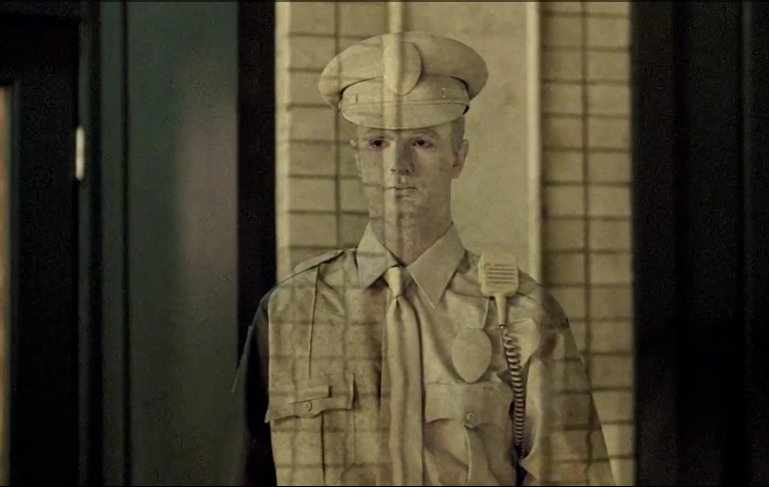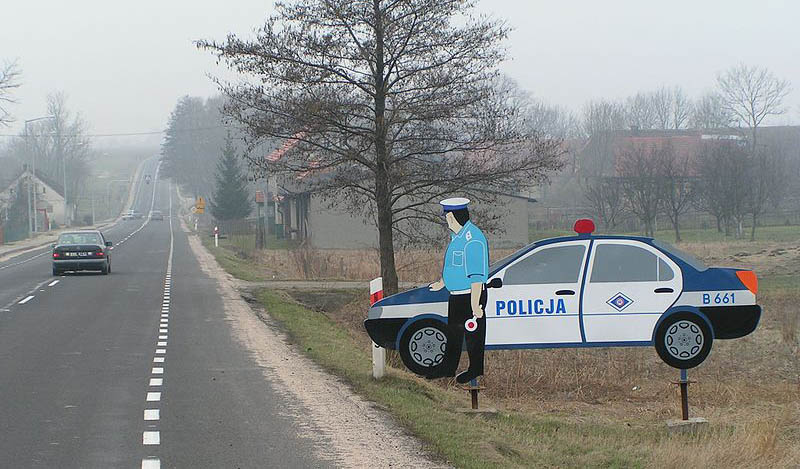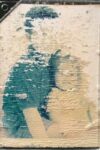
A consideration of the police institution encounters nothing essential at all. Its power is formless.
— Walter Benjamin, Reflections
whos gonna rake all these leaves up?? the police? #TheThursdayNiteRant
— @dril
The most obvious fact about the police is also the most unsettling, which might be why it’s rarely mentioned: cops aren’t real. This isn’t to say that they’re some kind of figment of the collective imagination; they’re plainly here, but theirs is a presence that doesn’t seem to have the same kind of existential rootedness as more usual objects: tables and chairs and criminals and so on. Cops seem to hover just on the wrong side of any sensible ontology; for all the direct physicality of their violence, there’s also a lingering sense of the unearthly and the spectral. This might be why people tend to get so spooked by them: approval ratings for the police tend to fall after any kind of encounter. It doesn’t matter if they’re baton-charging your picket line or returning your lost cat: there’s something about cops that produces a kind of queasy, crawling revulsion. The sense of a ghost at the feast. It comes out in the names we find for them: scum, filth, pigs. Cops induce abjection; they’re neither subject nor object but disturbingly liminal. You can see this in Gogol’s short stories: whether it’s someone’s nose running off on its own accord and impersonating a minor noble or the ghost of a civil servant stealing overcoats, all spectral happenings end up coming under the domain of the police. No wonder TV schedules are saturated with reality shows about them. We’re shown an unending montage of cops chasing down speeders and rounding up drunks, giving a weary smile to the camera after making their arrests, all to make sure we know that they’re people just like us. All this desperate propaganda only points towards the hideous truth: they’re not like us at all; they’re something entirely alien.
There’s a story about an American anthropologist who married into a Yanomami tribe after living with them for several years; eventually he left, bringing his wife with him into what is still occasionally called civilisation. The Yanomami had heard of the police, but they imagined them to be a particularly fierce and sadistic tribe that all lived in the same village. In Caracas, she’d eye street cops warily, looking out for cop children and cop babies, wondering what their presence amongst normal people could mean. Of course, her analysis of the police is completely correct. There are cop children and cop babies. Cops can take on any form, and anything has the potential to be a cop. Last year, it was discovered that police in the UK were using the identities of dead children as covers for undercover work. As activist groups across the world have discovered, any movement with more than ten people most likely harbors a parasitic, shapeshifting cop. The first game of shifting ontologies that children learn to play is cops and robbers, and it’s always so easy to turn yourself into a baton-swinging policeman. In earlier times it was known that inorganic objects could at any point become infected with vampirism and turn against their owners; now we know that everything has the potential to become a cop. Media coverage of a ‘cops off campus’ demonstration in London predominantly focused on a single bin that had been set on fire by protestors. Why? Was the bin a cop? Are all bins cops? How many of the objects we take for granted are secretly watching us, concealing a hollow core of cop unreality?
Left-wing criticism of the police in society tends to focus on the rupture between what the police are ostensibly for — helping lost tourists; catching serial killers; and other such noble tasks — and what it is they actually end up doing — routinely harassing people of color, sex workers, and the economically underprivileged; breaking up protest movements; forming the last line of defense for capital. This functional gap is important, but it’s not all that it seems. Throughout history, all social institutions have had some kind of dual articulation. Egyptian pharaohs claimed to be avatars of the divine temporarily manifesting themselves among mere mortals; in fact they were petty tyrants degenerated through successive generations of incest and sacrificing needless thousands to their obscene pyramidal obsessions. Feudal lords claimed to be divinely appointed guarantors of the safety of their loyal but non-consanguineous subjects, while in truth being rentiers with pretensions and silly hats. Today this double structure is everywhere. Schools and universities pretend to be dedicated to the universal ideal of knowledge while in reality imparting the skills and ideologies of the workplace, courts pretend to deliver holy justice while lending false legitimacy to the prison system, militaries pretend to protect global human rights while engaging in the same old resource-grabbing, and so on ad nauseam. Any organ of an essentially unjust order needs to plug itself into some grand metaphysical narrative to do its work unimpeded. Cops are different. Uniquely, they dissimulate, pretending to be more boring and quotidian than they actually are. They’re hiding something.
The story we’re told about the police centers on the idea that police work is a series of everyday, unconnected incidents. Their job description might be accommodatingly vague — upholding law and order, protecting and serving — but what it involves is essentially reactive. A crime appears, or a situation develops, and the police come along to return things to normal. This is why reality cop shows appear as a slow procession of events without narrative, and why detective dramas start each week’s episode with a new mystery. The leftist charge that cops ultimately exist to protect the interests of capital falls victim to this too: it presents cops as static guardians, knocking away various incoming threats to their moneyed masters. (Even Marx falls into this trap, describing in the Economic and Philosophic Manuscripts of 1844 how the labour of the criminal sustains the legal system.) The truth is very different.
Cops don’t uphold the law, they haunt it: the police only uphold the law in the same sense that a poltergeist upholds a cabinet as it drifts menacingly through the air. Cops are to the law as poltergeists are to interior design: it’s a process of deliberate and malicious reconfiguration. Legality — which is for the most part a static, regulatory structure — has existed for thousands of years without needing a police force to enforce its regulations. More often than not, cops follow the law less than they constitute it: something becomes illegal because a cop decides you can’t do it, or it becomes legal because they do it themselves. Until the passing of the Police and Criminal Evidence Act of 1984, law enforcement in the UK were technically banned from questioning arrestees before trial. The Act only put on vellum what the cops had already been doing for decades. The harassment of ethnic minority individuals through stop-and-frisk policies isn’t just a simple reflection within the police of a general societal racism; often it’s a process by which that racism is constituted. Every time a kid is detained and searched on the street for the crime of being black, structural racism isn’t just perpetuated but produced.
To really excavate the horror of cop-being you have to examine not their everyday brutality, but their strangely sinister positive self-image — the role they’ve allotted for themselves. Each of their mundane tasks eventually unfurls to reveal itself as an enormous metaphysical project. The friendly helpful police of the bourgeois imagination are those whose job it is to work things out — they solve mysteries, they give directions, they match crimes directly to perpetrators. In other words, the order they’re supposed to maintain isn’t so much a socio-political order as a linguistic one (if the two can be distinguished). They’re here to straighten out the sometimes unruly network of significations. In detective dramas the killer is generally someone quite mild and unassuming; the task of the police is to make sure all bad guys are properly identified and attached to their name as bad guys, to protect against any kind of ambiguity of meaning. They are mobile agents of a very immaterial network of signs, giving a designation to everything and everything to its designation.
What this actually looks like can be seen on a grand and terrifying scale in the aftermath of the 2013 Boston Marathon bombings. Public institutions and transport networks were closed, residents were asked to stay in their homes, the tenth-largest city in the country was completely shut down. The contrast with the 9/11 attacks — after which Americans were told to go out, shop, and continue as normal — couldn’t have been more stark. Cops didn’t put Boston on lockdown because of the threat posed to the population; other triple homicides don’t tend to provoke the same reaction. The threat posed was to the order of signs. There was no claim of responsibility for the bombings; as the smoke cleared there were those who automatically blamed foreign Islamic radicalism and others who suspected the white far right. When the Tsarnaev brothers were identified it was as a zone of indistinction — US citizens but foreign-born; Muslims but not particularly devout, and not only Caucasian but actually born in the shadow of the Caucasus mountains. The only response to these tangled ambiguities was for the cops to straighten out the entire city, keeping everyone attached to their official residences while the militarised SWAT teams went from door to door making sure everything was in its proper place.
It’s not that this imposition of semiotic order has to follow the contours of reality — after all, reality is often very messy and ambiguous, and in a disordered world the imposition of order is always in a sense arbitrary. It’s something imposed on the world from outside, by unworldly means. Whenever cops are involved strange and supernatural things always seem to happen: drugs will mysteriously pop into existence on someone’s person, innocuous objects will briefly transform themselves into guns or knives, something like demonic possession will overcome members of the public, turning them into violent monsters that need to be put down. Of course, all this magical energy will often play havoc with any sound or video recording equipment in the area, wiping out any record of what took place. It doesn’t matter that none of this makes any sense, as long as everything’s nicely in order. Anyone shot by police must have been doing something wrong, otherwise they wouldn’t have shot them.
This power to attach every referent to its signifier requires judicious use of the gaze — or as it’s often termed today, surveillance. Again, this isn’t a hidden or secret function: the stated role of the police is not only to untangle every mystery, but to watch and observe everything and everyone. Cops have schemes and projects. In 2003, the NYPD launched a project to meticulously document every activity among the city’s entire 9,000-strong Moroccan community. As the leaked documents that revealed the project made clear, it was only a trial run. The broader plan is to turn our world from the one we still occasionally recognise into Planet Cop. Children seem to grasp all this intuitively: when they’re forced into a corner they know how to react. I’ll tell the police on you. It works. The invocation of the police is the same as the police itself; it’s an appeal to the police as the universal gaze. It’s not a voyeuristic gaze, but the uncanny paranoid sensation that you’re being watched — being watched in the passive voice, with the gaze emanating from a void. As Lacan makes clear, the gazer does not exist and the gaze can only be something that happens to you, but if you go and investigate this gazing void, chances are you’ll find a cop there, watching you. The conclusion is difficult but impossible to ignore. Cops can change their form at will, they can bend the laws of physics, they operate on the level of the immaterial, and their gaze comes from a void. They’re not real.
But despite all this, every knock of truncheon against skull affirms the actuality of the police. Where did these spectral beings come from, and how did they get here? At this point it’s only possible to speculate. The most likely and logical explanation is that cops come from some pocket universe or some spectral realm, a shadow-land trapped between real existence and the nothingness that surrounds it, and that somehow they broke through into our existence and started rearranging it according to their whims. It’s not inconceivable that all our inchoate messing around with repressive state apparatuses didn’t just open up a breach between worlds but actually invited them in. The object of the cop invasion, of course, is to steal our ontology, our quality of being, and take it for themselves.
It’s a doomed project. If there’s a quality that distinguishes something real from something unreal, it’s a capacity to exist beyond its own image. We’ve understood for a while that there’s a deep and perilous gulf between the sign and the referent; that you can never refer to anything in its totality with the insufficiency of language. There’s always an essential remnant, something left over that can’t be said. This applies in particular to human beings: we always have an incredible potential to transform ourselves and our modes of existence far beyond anything we yet have a name for. This is what the cops want for themselves. They think they can take it by denying us this potential and by imposing the rigid order of names and signifiers. It’s not working.
The innumerable instances in which armed cops have gunned down members of the public at random could be considered as a desperate act of frustration with this situation. In 2012 a gunman killed a former co-worker outside the Empire State Building; in response police fired sixteen rounds at the surrounding bystanders, injuring nine people. In separate incidents during the Christopher Dorner manhunt in Los Angeles, cops opened fire on two cars entirely unlike that driven by Dorner, driven by people who didn’t match his description. Recently, as angry crowds demanded justice for the killing of Mike Brown in Ferguson, cops unleashed a vast armory of weapons against them. Why are they doing this? It might be necessary to try to imagine what it must be like to be a cop, however great the divide that separates us from them. Cop ontology is pain, unending pain: the sensation of manifesting in the world while only being half-real can only be a constant, unendurable agony. Over the centuries this pain has been rising to a fever pitch, and these random shootings are acts of desperation. They’re trying to draw themselves into being using the violence that they’ve by now become so accustomed to. Their problem is that the power and influence they’ve gained over this world is so total that they can do anything they want except transform themselves. Juries tend not to find against cops, even when the cops are revealed to have been lying, as in the Mark Duggan inquest. The signifier ‘police’ encompasses and justifies everything they do, and they can’t break out of it.
All good ghost stories end with the ghost resolving its attachment to the world and finally being able to pass on to the other side, but what we need to write is a good human story. Perhaps the only way for us to defeat the cops is to give them what they want. Not to give over altogether our potential for radical transformation, as their mad plan would have us do, but to redefine their role in such a way that they might be able to pull themselves into reality. Eggon Bittner remarked that as things stand, ‘no human problem exists, or is imaginable, about which it could be said with finality that this certainly could not become the proper business of the police.’ This needs to be rolled back. Maybe we should have the police tending gardens or breaking rocks for a couple of years. Have them create a sense of order that doesn’t directly restrict the capacities of others, that aligns with reality rather than being opposed to it, that arranges actual matter rather than playing an impossible game with linguistic signifiers. We need to bring them into intimate contact with the full materiality of our world. Afterwards, maybe, they might be able to shed their cop-unbeing and enter society once more — not as ghostly parasitic invaders, but as normal, peaceful, fully real people.
This post may contain affiliate links.








